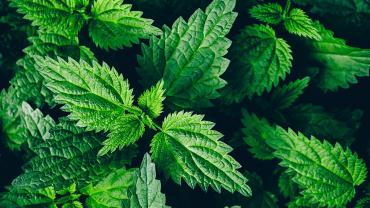
Seasonal allergic rhinitis, often simply referred to as seasonal allergies, has an estimated prevalence of 14% in US adults and 13% in US children. Symptoms typically include nasal congestion, sneezing, runny nose, and itching. It is an immunoglobulin E (IgE) antibody-mediated, inflammatory condition typically triggered by allergens, such as pollens. As part of the immune response to allergens, Th2 cells release interleukin-4 to stimulate B cells into producing IgE. The IgE attaches to basophils and mast cells so they are sensitized to the allergens. Upon exposure to the allergen, these cells degranulate and release mediators, including histamine and prostaglandin. Histamine, prostaglandins, and other mediators trigger an inflammatory response.
There are many traditional remedies under investigation for their potential benefit in supporting seasonal allergies. Nettle is one such herb with the potential of supporting a healthy immune response to allergens and promoting a healthy inflammatory response.* Nettle contains many potentially beneficial compounds, such as adenine, nicotinamide, synephrine, and osthole, which may have anti-inflammatory and anti-allergenic properties. The compounds in nettle may promote a healthy inflammatory response by inhibiting cyclooxygenase-2 expression and the release of inflammatory cytokines and chemokines.* Nettle may also block histamine production and release and hinder mast cell degranulation to support a healthy immune response to allergens.*
In an animal study, researchers tested the efficacy of nettle extract on a rat model of allergy-associated asthma. The researchers used ovalbumin from chicken egg, a common allergen used in studies to induce allergic inflammation, including pulmonary inflammation associated with asthma. In this study, the rats were sensitized to ovalbumin from birth to day 14. Then, they underwent an ovalbumin challenge on days 21, 22, and 23. The group that received 1.5 g/kg per day had a reduction in pulmonary inflammation and lipid peroxidation. The nettle extract also significantly inhibited increases in eosinophils, leukocytes, and lymphocytes.
In a clinical study, nettle demonstrated potential as adjunct therapy with standard therapy for allergic rhinitis. In this study, 40 patients with allergic rhinitis took either 150 mg of nettle or a placebo for 1 month. Those taking nettle had a significant reduction in the mean nasal smear eosinophil count and improvement in clinical symptoms.
Studies have demonstrated the potential for nettle to support seasonal allergies.* The compounds in this herb support a healthy inflammatory response.* More research is required to elucidate the specifics of nettle’s impact on seasonal allergies, but current literature demonstrates promising results.
By Kendra Whitmire, MS, CNS